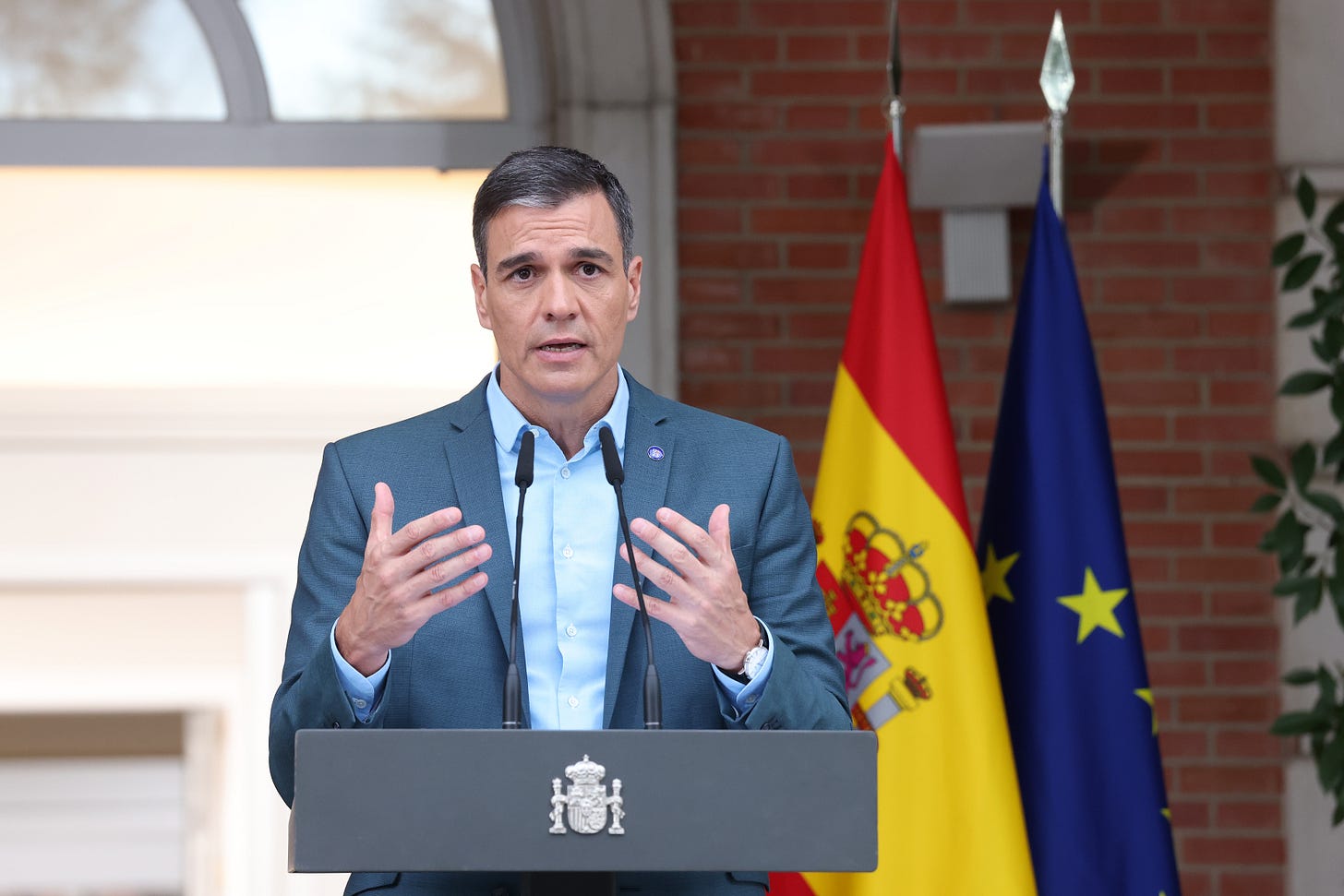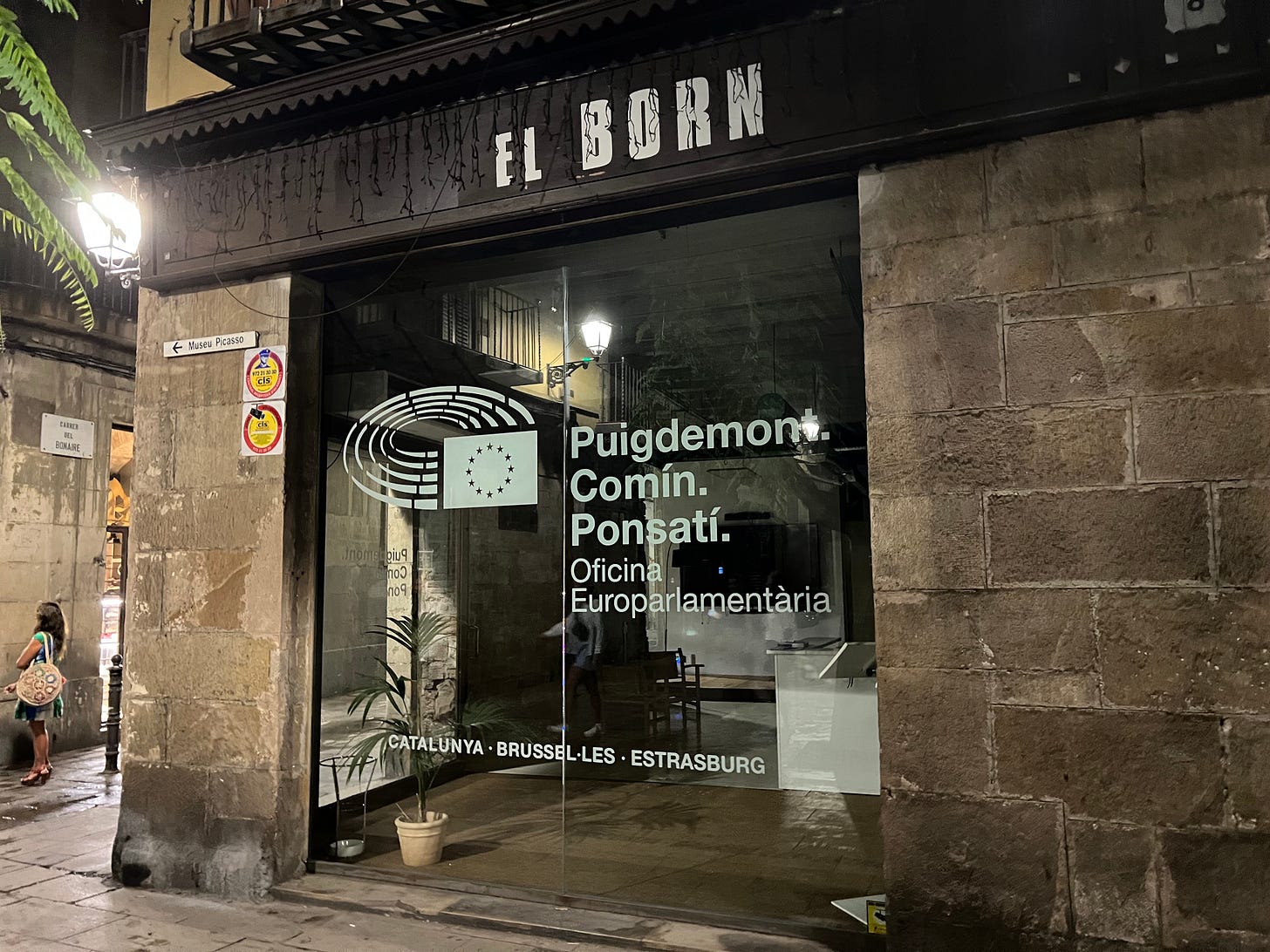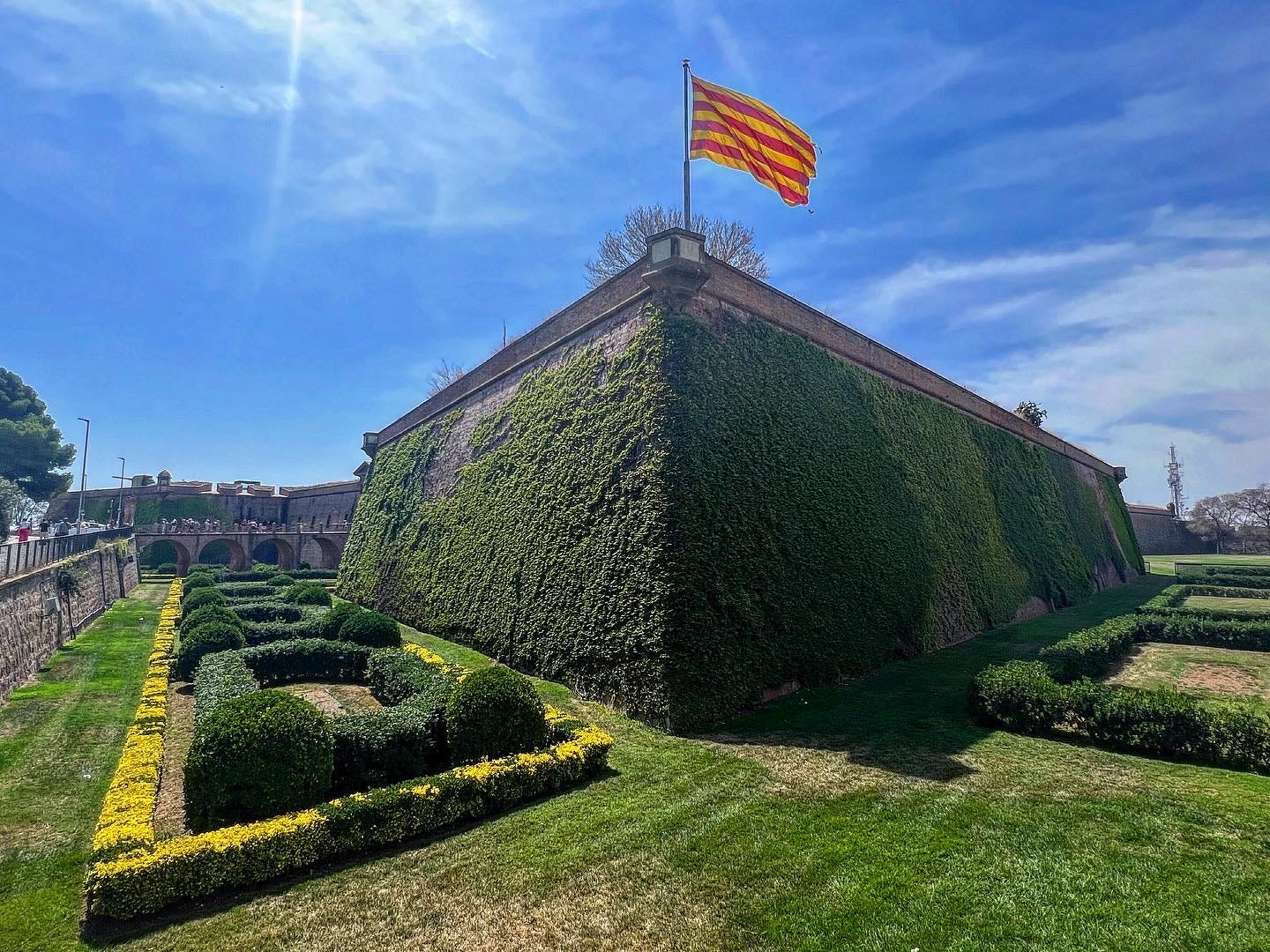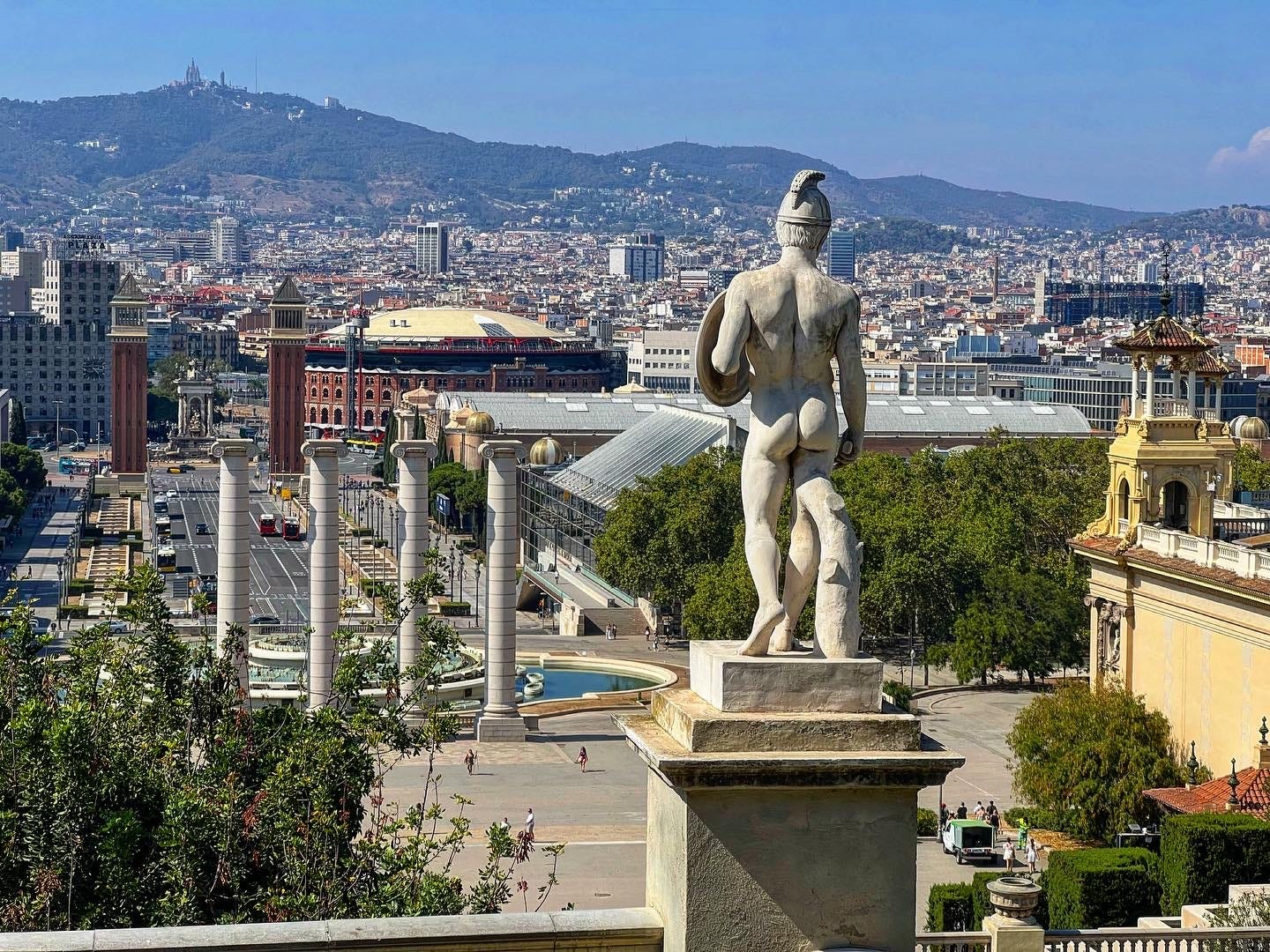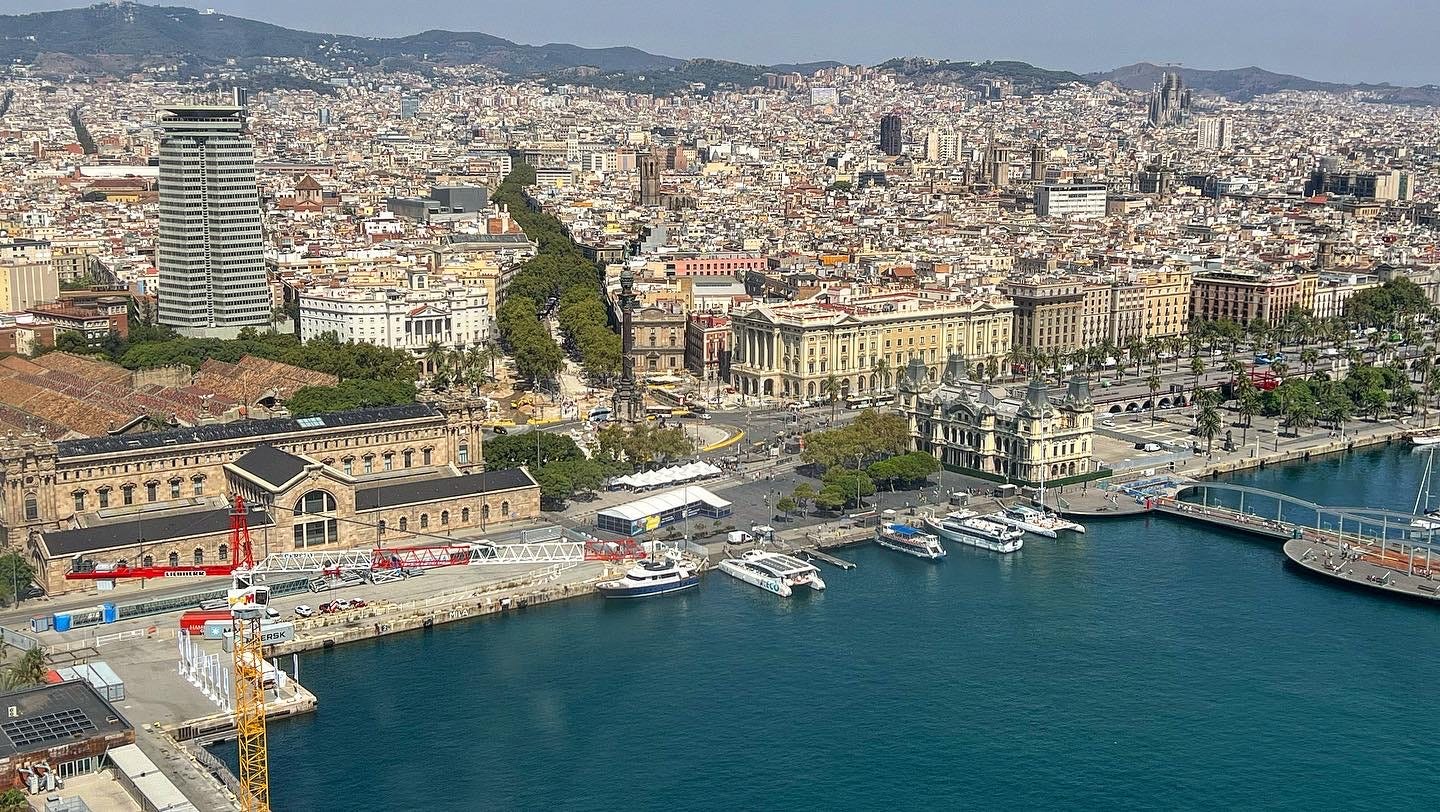Will Sanchez stay in power by promising Catalans things he can’t deliver?
It’s now looking fairly likely that Spanish Prime Minister Pedro Sanchez will cling onto power by allying with Catalan separatists. That support doesn’t come for free.
I’m in Barcelona this summer, spending all of August here working on a project, and it’s an interesting time to be in Catalonia. Following last month’s inconclusive Spanish election, negotiations are ongoing to form a government and the Catalan separatists have emerged as the kingmakers.
Center-left Prime Minister Pedro Sanchez, who had to call an election in the next year and was expected to be defeated when he did, took a risk by calling a snap election early shortly after he suffered a big defeat in local elections in May. His bet was that voters would be turned off by the local government formation negotiations ongoing at that time, with the center-right Popular Party (PP) entering local alliances with the new far-right party Vox. PP leader Alberto Feijóo was expected to do the same at national level if PP and Vox could together win enough seats to control the parliament. But Sanchez’s gamble paid off. Though Feijóo’s PP may have “won” the election by coming in first, they and Vox did not win enough seats to form a government. With the memory of General Francisco Franco’s far-right dictatorship still very fresh in this country, voters were turned off by the prospect of the far-right re-entering government after four decades (something not felt in other countries where memories of fascism are not as fresh, such as Italy).
Last week Spain’s king tasked Feijóo with trying to form a government, something that is really just a formality at this point because Feijóo has already exhausted all possible options (no other party will work with Vox). Now the Spanish parliament president (a Socialist Catalan-speaking Sanchez ally elected earlier this month by teaming up with the Catalan MPs) must fix a day to hold a vote on supporting Feijóo as prime minister. Once that vote fails, as it surely will, then the clock starts ticking. Sanchez will have two months to try to form a coalition, otherwise he will have to call a new election early next year. It is in his interest to draw out this process as long as possible in order to have more time for negotations with Junts per Catalunya, the Catalan independence party headed by exiled MEP Carles Puigdemont, currently living in Belgium because he faces arrest in Spain. His office still sits empty in Brussels down the street from where I’m living in Barcelona. So you can expect the parliament’s president to schedule the vote on Feijóo as late as possible.
Promises he can’t keep
Already, in order to secure Junts’ support in the parliament president vote, Sanchez had to promise he will ask the EU to make Spain’s regional languages of Catalan, Basque and Galician official languages of the European Union. Spain currently holds the rotating presidency of the EU Council and will put the issue up for discussion with the 26 other EU countries in September, following a letter sent to the Council this month.
But here’s the rub – the other 26 countries are almost certain to reject this request (unanimous support is required). Right now there is no regional language recognized as an official language in the EU, only 24 national languages. Two of those languages, Maltese and Irish (added as an official language last year) have no unilingual speakers just like the three Spanish regional languages (effectively all Irish and Maltese speakers also speak English, effectively all Catalan, Basque and Galician speakers also speak Spanish). Some have questioned whether the millions of euros now being spent translating and interpreting EU proceedings into Irish is worth the money given that Irish citizens speak English and Irish is largely a ceremonial or cultural language (with some exceptions in rural communities). But it is technically Ireland’s national language so it was a hard request to deny. However, for a regional language, governments are likely to feel differently.
There will be concern that granting this status to a regional language for the first time will open Pandora’s box, with other regional languages in the union quickly following suit and before you know it there could be 40 official languages costing taxpayers millions of euros to translate and interpret. Italy would likely veto with a worried eye to the Sardinians. Sweden and Finland will be thinking about Sami, and France looking at Corsican and Breton. Estonia and Latvia would veto with a worried eye to their enormous Russian-speaking population (30% and 40% respectively), as would Bulgaria with their Turkish-speaking population (10%). Would EU citizens be excited about the prospect of paying for Russian and Turkish to be used as official EU languages?
Of course, Junts doesn’t want Catalan to be a regional language, they want it to be the national language of independent EU member state Catalonia. And that’s the core of the further demands, in exchange for supporting Sanchez as prime minister. Junts has laid out their conditions for support: an amnesty for Puigdemont and the others facing arrest in Spain for organizing the unauthorized independence referendum in 2017, and the promise of the national government authorizing a legal independence referendum in Catalonia. Puigdemont has said amnesty is a “red line” for Junts’ support, indicating that they may be more flexible on the second demand. The Left of Catalonia, the other separatist party that is a more natural ally for Sanchez, has also said amnesty is a red line.
But whether Sanchez has the power to grant amnesty is highly dubious, given that the matter is being handled by the judiciary with which he cannot interfere. Nevertheless, Sanchez has suggested that he may give them this promise. Last week he said he is in favor of a path of “dialogue” and “coexistence”, and the agreement for support in the parliament president vote mentioned a “de-judicialization” of the political conflict in Catalonia. This suggests that Sanchez is ready to support a general amnesty law. But such a law would be challenged in the courts, given that it would seemingly violate the post-dictatorship Spanish constitution of 1978 which forbids regional independence referendums. Asked repeatedly by reporters last week if an amnesty law would survive legal scrutiny, Sanchez said that would be for the constitutional court to decide.
It is the same situation for whether Sanchez would have the national government authorize a Catalan independence referendum – official this time unlike in 2017 – and honor its result (as was the case with the UK national government and the failed Scottish independence referendum in 2014). The courts are likely to decide that Sanchez does not have the authority to authorize such a referendum because it violates the constitution, which is a document that overrides any law the parliament can pass. So on all of these issues, Sanchez seems to be preparing to promise things he knows will be overridden with others. In the case of Catalan as an official language of the EU, he knows it will be rejected by other EU governments. For the amnesty and the referendum, he knows it will be rejected by the Spanish courts.
The Catalan separatists aren’t stupid, and they know that such promises may not be worth the paper they’re written on. But having such a u-turn from Madrid (no national Spanish government has ever supported an independence referendum of a region) could be the first step toward changing the constitution to allow them. That may be the key thing to watch in the coming weeks and months. Might the Catalans ask for a constitutional convention in return for supporting a third term for Sanchez?
The long game
Here’s where a bit of history and context on Catalan nationhood might be helpful. Most people don’t understand that, like most European countries, “Spain” is actually not very old. We’re taught that Spain conquered the new world, but until the 18th century there effectively was no Spain, only a Spanish crown. It was Castille that conquered the new world – a kingdom that was entirely separate from the other territories held by the Spanish crown such as the Kingdom of Navarre (Basques), the Principality of Catalonia, the Kingdom of Valencia, the Kingdom of Sicily, the Spanish Netherlands (Belgians), the Kingdom of Naples, and the Kingdom of Sardinia. It was a kind of confederation with different Councils running the different kingdoms.
The territories of the crown of Aragon in Iberia were as separate from Madrid as Belgium or Sicily. These were run as separate polities, with autonomy, until the creation of the nation-state of Spain by the Nueva Planta Decrees of 1714, abolishing all the former kingdoms and territories controlled by the Spanish monarch and absorbing them all into Castille (by that point the Spanish king had lost the territories in the low countries and Italy, as well as Portugal which was part of the Spanish monarchy from 1580 to 1640).
It was the time of burgeoning nationalism in Europe, when the concept that states should be based on common culture and language was being invented. The old monarchies, which before then had viewed the culture and language of their subjects as irrelevant, suddenly had to transform themselves into nation-states and convince their subjects that they were now “Spanish”, “French”, “British”, “Swedish”, etcetera (a phenomenon written about brilliantly by Benedict Anderson in his book Imagined Communities). Some were more successful than others. In what we today call France, less than 10% of citizens spoke the French language at the time of the revolution. The entire south of the country spoke an entirely different language called Occitan, closely related to Catalan. Today that language has been almost entirely wiped out, along with France’s other regional languages of Breton, Basque, Catalan, Corsican and Alsatian German.
Spain spent the 18th century embarking on a similar campaign of “Spanification” but were far less successful. Like France, they banned the official use in education or politics of regional languages that were not Castilian Spanish. One only need to look today at the difference between Spanish Catalonia and French Catalonia (the area around Perpignan and Roussillon taken by the French after betraying Catalonia in the Franco-Spanish War in 1659) to see the difference. Catalan has been erased from the French part, but in the Spanish part it is still very strong and widely spoken.
To my great frustration as someone with a degree in European history, nineteenth century nationalism still shapes our education systems today, especially in Europe. So much of what Europeans are taught about their history is based on this 19th century myth-making. We’re taught that Spain, France and Britain are constant entities existing for a century, when in fact they only emerged in any form recognizable from the countries we know today at the same time that the “new” countries like Germany and Italy were being created. That’s why it can be hard for foreigners to understand the Catalan independence debate. We are taught that Spain is Spain, and has been forever. In fact, the nation-state of Spain isn’t much older than the United States. And the brutal Nueva Planta Decrees that created Spain are as fresh in the memory of Catalonia as the American Revolution is for the United States. Except while the US won, Catalonia lost. Over and over, for 300 years.
The issue of Catalan independence is complicated. Catalonia is a rich area, as is the Basque Country, and just like the Flemish independence debate in Belgium a lot of it comes down to money. Some in these rich areas don’t want to subsidize poor areas of the country, and want taxation and expenditure to be controlled at regional level rather than living in a “transfer union” where their money flows south. But it is also, of course, also about identity and pride – and long-simmering anger over what the Madrid has done to Catalonia over the previous centuries, most recently under the Franco dictatorship during which Catalan was brutally repressed. Much of it is just about symbolism and respect.
I was thinking about this the other day as I passed the Christopher Columbus monument at the old port, which I’ve been passing every day this month. It is, in my opinion, one of the most obscene and absurd monuments in Europe. Obscene for the obvious reasons about the man it is honoring. But also absurd because Columbus had no connection to Barcelona.
It was built in 1888 at a time when Castilian elites in Barcelona wanted to push a narrative of the Genoese sailor being a “son of Catalonia” (some even tried to push a bogus idea that he was actually born in Catalonia). The stated connection for the statue is that Columbus reported the results of his first voyage to King Ferdinand and Queen Isabella while they happened to be at court in Barcelona. It is, as far as is known, the only time he was ever in this city. But he was reporting only to Queen Isabella because he undertook the voyage on behalf of Castile, not Aragon. And a little-known fact is that it was Castile, not “Spain” (which didn’t yet exist), who established the overseas empire in the new world. Barcelona, as part of the territories of the Crown of Aragon, was actually legally forbidden from trading with the new world - only Castile could trade with the colonies.
The push to tear down this monument has come from two directions. One is from people who say it is wrong to celebrate this man and the subsequent killing of 90% of the population of the Americas he initiated (they organised a protest in 2020). The other is from the Catalan independence party Candidatura d'Unitat Popular, who tried to remove it in 2016, 2018 and 2020 - arguing that it presents a false idea that Catalonia/Aragon was involved in the conquering and colonisation of the Americas.
It is these kinds of national myths that the far-right Vox party wrap themselves in. They are fiercely nationalist and opposed not just to separatism but to any forms of regional autonomy for Spain’s regions. They want Spain to be a purely centralised country like France. As political descendants of Franco’s Falangists, they hold the integrity of the Spanish nation and the universalism of the Catholic Church as the two highest pillars of priority. They push back hard against any suggestion that Spain did anything wrong in its colonization of the new world, accusing such narratives as being a British-American conspiracy to tarnish the reputation of the Spanish Empire and distract from their own misdeeds. For them, monuments like this Columbus status in Barcelona are very important. And any suggestion to tear down these nationalist/Catholic dogmas must be met with force.
And so, there was incredible unease here in Barcelona, a very leftist city, ahead of the July election. The main reason things have calmed down here since the chaos of 2017, which saw the whole city shut down for long stretches of time in protests and counter-protests surrounding the referendum and its aftermath, is because of the election of a center-left government that was more conciliatory toward the region than the PP had been. Catalan separatists may hate the PP, but they loathe Vox. Vox entering government could have kicked off everything here all over again, bringing Barcelona into another period of chaos as it fought with a right-wing government in Madrid. That is something no one here, be they separatist or unionist, wants.
Even as it now seems most likely that Sanchez will cling to power, the future is still uncertain and most Catalans are quite nervous about the possibility of a second election somehow returning a better result for PP and Vox. In the meantime, the negotiations between Sanchez and the separatists are going to be fraught given they involve things that Sanchez simply can’t guarantee. Nevertheless, it does seem like he’s going to hang on for a third term in the end.




